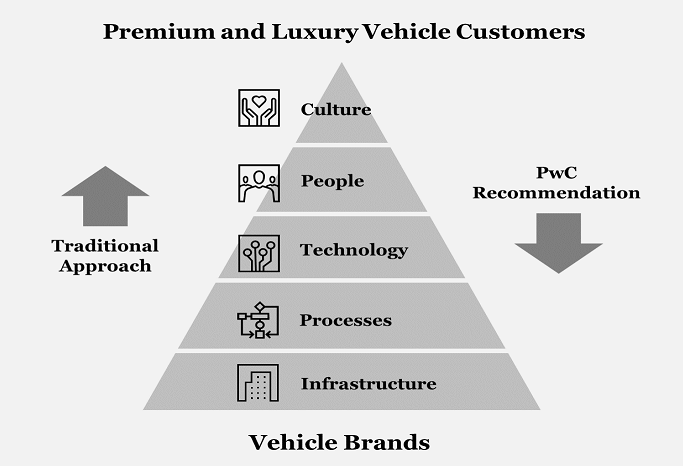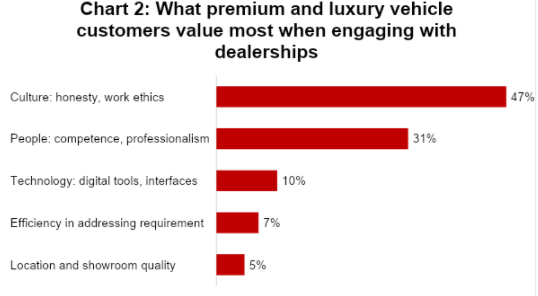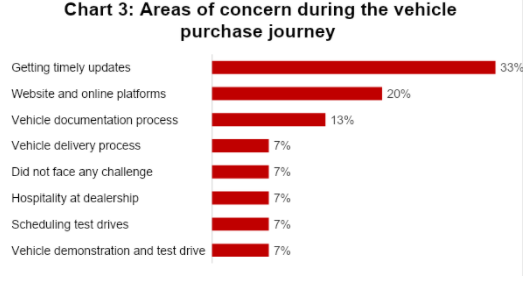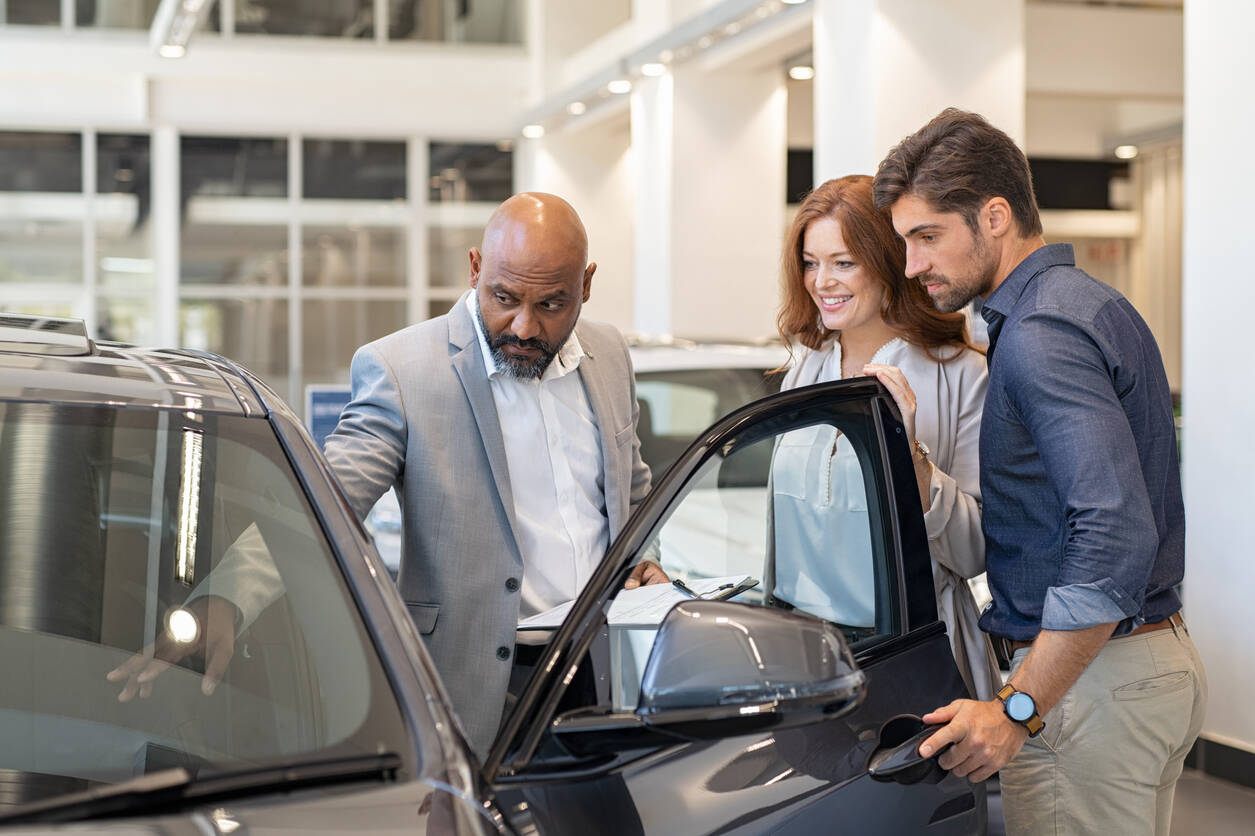Premium and luxury vehicle customers in India are increasingly making choices based on how special the brand makes them feel. This is more so as competitors almost reach a level of parity as regards the car’s features, performance and quality. While investments in dealership infrastructure and technology are critical the real customer experience differentiator comes through personalisation of the entire purchase and after-sales process
Premium and luxury vehicle brands must now go beyond merely demonstrating the cues and symbols that communicate and deliver status and luxury, be it the showroom and workshop infrastructure that uses exquisite furniture and façade, or well-groomed, sophisticated and tech-equipped manpower. Brands also need to showcase an ability to relate to their customers’ attitudes and lifestyles, their beliefs and value systems.
Personalising the customer experience requires a holistic approach of leveraging five key factors: Culture, people, technology, process and infrastructure.
Personalising the customer experience requires a holistic approach of leveraging five key factors: Culture, people, technology, process and infrastructure~
Human-centered approach
The journey to personalisation should follow a human-centered approach flowing from the top to the bottom as in Chart 1. Since the dealership is the frontline representative of the brand, it is critical to begin by nurturing the right culture and values at the dealership. The people at the dealership that represent the brand remain the key to delivering superior and consistent customer experience – with ‘culture’ topping it as the ‘key to continued and sustainable improvement in CX’.
The next level of technology should make ‘people’ productive and anchor their behaviour in the tenets that deliver the brand promise. Optimum levels of technology, the right mix of digital and physical, build stronger connect with customers, significantly improving the efficiency, comfort and convenience of their journey with the brand.
The traditional focus of premium and luxury vehicle brands and their dealerships has always been to create the best-in-class showroom and service infrastructure. And operate this with highly efficient and professionally managed sales and service processes- ‘standard operating processes or SOPs’. These continue to remain critical but should be really seen as foundational for delivering a personalised customer experience.
As shown in Chart 2, a recent survey by ET Auto found that nearly 80% of the respondents looked at ‘culture’ and ‘people’ to be the two most valued aspects in their engagement with the brand and its dealerships.
Source: ET Auto Survey
This is a critical insight that even with the increasing thrust today on digitalisation and technological innovations, the softer elements of the business remain most important. This implies that premium and luxury brands must prioritise investment in their ‘culture and people’ elements in order to provide a more personal, human-centered and direct engagement with their customers.
The trifles that enhance customer experience
Differentiated experience is no longer about one or two ‘wow’ moments. It is a sum of a lot of little things working together in harmony with a singular focus on the customer’s needs and preferences.
Chart 3 shows the findings of a recent online consumer survey by ET Auto, which highlights the customers’ key areas of concerns.
- Thirty-three per cent of the respondents mentioned getting timely updates throughout the journey, from vehicle booking to vehicle delivery, as a key challenge.
- Twenty per cent of the respondents indicated finding relevant information on the brand’s website at the time of research and evaluation as another significant pain area.
Source : ET Auto Survey
The survey highlighted that customer experience was relatively better during the post-purchase stage with 20% of the respondents reporting that they were happy with the after-sales service they received, an indicator that focused efforts by these brands at improving their after-sales customer process over these years was indeed yielding the desired results. However, over 20% of respondents reported that getting a fair and accurate service requirement assessment and the related cost of servicing continued to be their top challenge.
Differentiated experience is no longer about one or two ‘wow’ moments. It is a sum of a lot of little things working together in harmony~
Make processes customer-centric
Based on the recent PwC study on ‘Best practices in premium and luxury vehicle retail’, we believe that there is a clear need to redesign business processes to make them customer-centric. Most of the premium and luxury vehicle brands implement their global standard operating processes in the Indian market. With the trend towards personalisation there is a pressing need to redesign the processes to suit the expectations of the Indian customer. Some of our recommendations are:-
- Redesign business processes and operating models for higher levels of ‘direct’ engagement with the customers – throughout their journey.
- Adopt a ‘consultative’ sales approach with designated ‘customer managers’ that offer a more personalised, empathetic and solutions-oriented approach to selling.
- Redesign showrooms – infrastructure, people and processes – to function as brand experience centres.
- Build technology platforms that provide a high level of customer connect and a 24×7 availability – with visibility and ability to track all transactions in real time across the customer journey.
- Build dynamic digital properties deploying AI/ML to provide a high level of personalisation and delight using immersive and augmented purchase experiences.
Human-centric transformation
A human centred transformation is necessary for a delightful premium and luxury vehicle experience. Post Covid-19, we are stepping into a future where customer expectations are getting reset across markets. It is imperative for the premium and luxury vehicle brands to transform their CX practices to be ready for this future. These brands could adopt the following initiatives:-
- Effectively communicate to the culture of the customers, through stories, artefacts, and most importantly through actions
- Deliver experiences with the right human touch, bringing delight to the customer
- Use the right mix of physical and digital technologies required to elevate customer experience
- Design customer-centric processes to connect emotionally with the customers
The key to success in the premium and luxury vehicle market lies in transforming culture, people, process, technology and infrastructure to be human-centered. Companies that recognise and implement this change will be able to deliver a unique and differentiated customer experience and win customers for life.
(Kavan Mukhtyar is Partner, Management Consulting & Automotive Leader, and Rahul Bhargava is Director, Management Consulting, Automotive, PwC India. They have written this article with inputs from Amit Joshi, Principal consultant. The insights are derived from a recent study by PricewaterhouseCoopers (PwC) on premium and luxury vehicle best practices, and an online survey by ETAuto.)


















